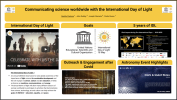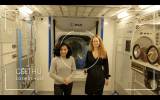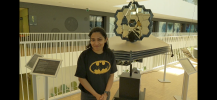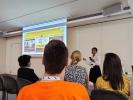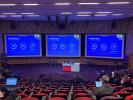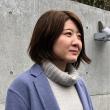Your Interview Geethu Paulose
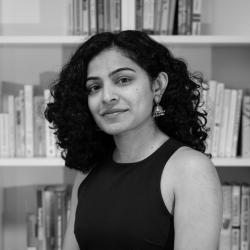
Geethu Paulose
Non-profit, Outreach
The Netherlands
Introduce yourself (name, company, position, country) and tell us how you got into lighting design (including education/qualifications).
Hello World! I am Geethu Paulose, an earthling born in a beautiful town called Kochi in the state of Kerala in India. I live in another lovely part of the world up north, in the Netherlands, with my partner Jijo Chacko and my inseparable beagles, Bobby and Summer. I am the Communications Coordinator of the UNESCO International Day of Light and the Communications Manager of the Astronomy and Society Group at Leiden University.
How did you get into your current role(s)?
My life took a new turn the very first day I learnt in school that our Sun is a star. My imagination ran astray thinking how differently I drew the sun and twinkling little stars in my sketchbook until then, and I wanted to know more. I remember racing to the school library to collect all the books I could find about space and astronomy and getting happily lost. And even before I knew it, I had set myself on an endless pursuit to understand the cosmos deeper, driven by curiosity, passion and interest. Even with limited opportunities, I began to opt for the subjects, projects or work that took me closer to applying my knowledge in the field of space and astronomy. After my undergraduate studies in engineering, specialising in information technology from Viswajyothi College of Engineering and Technology, Kerala, I gained experience in tech by working as a senior systems engineer in Infosys. During this time, I developed an affinity for transferring my programming skills into astronomy research. My pursuit led me to the Masters in Planetary Science course at the University College London. Here I found love in the subjects - Astronomical Spectroscopy and Quantum Mechanics and worked with the ExoMol group for my masters individual research project. Following my MSc, I interned at the Raman Research Institute, Bangalore, India, investigating star formation in spiral galaxies. While explaining to my parents all the cool things I did in research or at work, I realised how challenging it is to explain science concepts in simple terms. I became interested in communicating my research and sharing my passion for astronomy with the public and started my own science engagement community called Cosmochase. After moving to the Netherlands in 2019, I interacted with my colleagues at the Astronomy and Society Group at Leiden University. I became interested in the group’s approach of using the astronomical perspective to inspire young people and foster societal development. I took the opportunity to work with the group’s editorial team. I am now leading the communication team of our group, where we focus on developing reliable, engaging and curiosity-driven content about the group’s projects and disseminating open-access resources to the general public. The communication node of the UNESCO International Day of Light (IDL) operates from the group, and since 2022, I have been leading IDL communication coordination.
Tell us about your work - what does your role(s) consist of?
The most exciting aspect of my Astronomy and Society Group Communications Manager/ IDL Communications Coordinator role is getting hands-on experience with the broad and diverse ‘flavours’ of communication. For instance, developing workflows using tools that facilitate the clear, concise and prompt flow of communication between internal team members and external partners. As the lead writer and editor of the Space Scoop children's magazine, I carefully break down complex astronomy content based on the official press releases from our partner institutes into a simple and engaging format for young people ( 8 to 12 years old). I also get the opportunity to collaborate with various organisations in the review and production of astronomy content (text/video), such as a telescope guide for libraries, a course review that introduces black holes to young students, develop our group brochure, interview scientists behind JWST research as part of the JWST - UNIVERSE exhibition at the Oude Sterrewacht, Leiden and more. Social media management is an inseparable part of my role that involves developing comprehensive campaign strategies to disseminate project resources and updates accessible to the broader public. For a massive global outreach initiative like IDL, social media is beneficial to connect with a worldwide audience and bring the world's focus to the valuable efforts of our volunteers who work relentlessly to raise scientific awareness and build society’s trust in science by organising various outreach events. I promote events organised worldwide and develop credible, relevant and creative content. I work closely with the steering committee to develop strategies to improve the event registration process, encourage broader participation, identify challenges, and think of innovative and efficient solutions. This year we created a quick survey to start with. Another vital aspect is news editorial which involves producing monthly IDL newsletters featuring highlights of IDL events from our partners and organisers, writing articles about IDL for various magazines and partner websites or giving interviews. Networking, presenting at conferences, managing IDL websites, promotional /scheduling tools, and strengthening connections and international partnerships are some other areas that I work on.
What is the importance of the IDL?
UNESCO’s International Day of Light (IDL) is a global initiative that provides an annual focal point to light and its role in science, technology, art and culture, education, and sustainable development, and in fields as diverse as medicine, communications, and energy. It is celebrated every year on the 16th of May, the scientific anniversary of the first operation of the laser by physicist Theodore Maiman. Since its proclamation in 2018, the five IDL celebrations have seen targeted science outreach events worldwide at all levels to broad audiences, including school children, science leaders, private sector partners and international political decision-makers. The broad theme of light will allow many different sectors of society worldwide to participate in activities demonstrating how science, technology, art and culture can help achieve the goals of UNESCO – education, equality, and peace and the UN SDGs.
How are you able to use astronomy as a tool for societal development and to impart a sense of global citizenship to the public?
Throughout history, astronomy has proved to be a vital tool for navigation, agriculture, shaping up cultures and answering the fundamental questions of our universe. The unique intersectional role of astronomy in facilitating cutting-edge technology, natural sciences, preserving culture and inspiring people makes it an effective tool for sustainable development. Imagine this, we all walk on the solid ground, the surface of our planet, Earth. The insides of our planet are intriguing. The Moon, our friendly neighbourhood natural satellite, seems to be hanging like a light bulb in the night sky. Now if we place ourselves on the moon and look back at Earth, everyone we know, the solid surface we walk on, all seems to be hanging in the night sky, as if suspended from nowhere. The concept of going to work at 9 AM just doesn’t make sense on the moon. How are we steadily swimming and suspended in this fabric of space and time? What exactly is the beginning of it all? What is our place in the universe? Isn’t it fascinating to even imagine this? Astronomy is captivating and inspiring, making it a great educational tool, especially in raising scientific awareness and generating interest among young people in pursuing science. Astronomer Carl Sagan’s infamous ‘Pale Blue Dot’ perspective of astronomy inspires one to embrace humanity and life in all its diversity. Combining the skills, infrastructure and knowledge of astronomers with the key partners and stakeholders of the society helps empower the community and contribute to socio-economic development and capacity building. This is the MO of all our group’s projects.
What is the biggest challenge that you have overcome in your career?
Imposter syndrome! Even with all these achievements, I struggled to find opportunities to pursue my research interest further. I faced numerous rejections every time I applied for a PhD, resulting in feeling incompetent, a failure or doubting my potential. Until now, I did not have a good network of colleagues in the field for support or guidance. I navigated based on my experiences and understanding, learning from mistakes and successes. But I always had the instinct to learn from constructive feedback and began understanding why I couldn’t secure interviews. One piece of advice I got was to look wider and not apply to the ‘elite’ institutions where the competition is extremely fierce, and another one was to work on my CV to explain the ‘gap periods’. While I did both, I became pretty uncomfortable with the eliteness of the institutes and the selection process that did not consider an applicant’s true potential. While astronomy as a science is inspiring, it is shocking to find reports on the gate-keeping nature of astronomy education in academia and the several existing biases. I began proactively looking for projects and teams that demonstrated a growth mindset and the ability to nurture true potential and talent beyond the norm. I saw myself getting out of my comfort zone, proactively setting up meetings, and attending open events to interact with various groups. That led to the fruitful collaborations that I am part of today. I still encounter challenges, but today I am surrounded by some fantastic women colleagues, a gem of a team and incredible human beings to give me the strength to find myself and work towards positively overcoming them.
How does light inspire you?
Light is information. The fact that everything that we know about our universe comes from studying the light from the objects in our cosmos, is quite inspirational. The play of light around mysterious objects in space sheds more information on the nature of the unknowns. The science of light drives technology and innovation. And the application of light science and technology impacts several sectors of society. Thanks to IDL's massive, relentless volunteering network, their work inspires me to join forces in raising awareness of the significance of light, and IDL is truly a global platform for outreach. To see the light as a form of expression, especially in art, culture, theatre, and philosophy, is fascinating. I admire the play of light and shadows in photography.
What is your message for other Women working in Lighting?
Reading about the brilliant work of all the incredible women in lighting is inspiring. I believe that women are born with strength, resilience and love. Women make dedicated creative leaders, efficient in overcoming challenges and unlocking many achievements. Trust your abilities and your journey, and the rest will follow. Empower, support and inspire the world, especially women and young girls, by sharing your stories and raising awareness of the significance of your work through outreach or public engagement. Thank you for this opportunity to get to know each one of you and for making my voice heard with yours too!!
“Empower, support and inspire the world, especially women and young girls, by sharing your stories and raising awareness of the significance of your work through outreach or public engagement.”
Selected portfolio:
